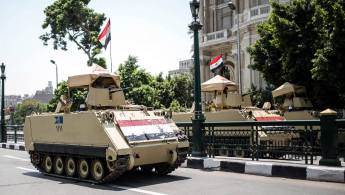Anti-Sinai hysteria grips Egypt following attacks
A campaign of hate against Sinai residents dominated Egyptian media outlets and social media this past weekend, after a suicide bombing killed 30 soldiers in Sheikh Zuweid, close to the border with Gaza.
Journalist Ehab al-Zalaqi was the first to draw attention to the growing antipathy towards the people of the Sinai. "The orders now are meant to pave the way, haphazardly, in every media outlet for the displacement of Sinai residents," he wrote.
Azzah Matar, an activist, added: "The Egyptian media are paving the way for the eviction of the Egyptian Rafah residents... no official will be brought to account, and there will be no confrontation of terrorism, but rather a forced displacement of residents, with all its painful, humiliating details."
Regime supporters had been using social media to call a harsh crackdown against the entire population of the Sinai, under the pretext of fighting terrorism and eliminating radical groups.
Sara Fehmi, a renowned supporter of President Abdul Fattah al-Sisi, called for action not only against the people of the Sinai, but also the Muslim Brotherhood and Hamas: "Oh Field Marshal [Sisi], put on your [uniform] and trample them with your army boots. We all stand by you, and so does God."
Engineer Hazem Abdelazim linked pro-Brotherhood demonstrations to terrorism: "Under such circumstances, any university student dog who demonstrates in solidarity with terrorists is a terrorist; these people should be hustled into police cars and arrested. There should be extraordinary laws."
Fighting back
While anti-Sinai sentiment was running high, activists launched a counter-campaign in solidarity with the peninsula's residents, using the hashtag #Blood_RunningUpToKnees to express their disgust at the repressive measures taken by the Egyptian Army, and the failure of security forces to put a halt to the deaths of Egyptians, whether civilians or soldiers.
Mohammad al-Jawadi, a supporter of the counter-campaign, tweeted: "You can trample flowers, but you cannot delay the advent of spring." Another activist mocked: "It seems the government will include blood in their ration card."
Other activists wrote of their surprise that government officials were not being held to account for military and civilian deaths.
For some, it appears that history is repeating itself, linking the campaign against Sinai residents to events that occurred half a century earlier, one person making the comparison of recent calls by pro-Sisi supporters to the Egyptian army's eviction of al-Niba residents during the Nasser era.
Unsurprisingly, Egyptian news websites were some of the most vocal supporters for the eradication or displacement of people on the peninsular. Some headlines requested a state of emergency to be declared in Egypt, while Al-Wafd, the organ of Egypt's oldest party, engaged in an unprecedented show of one-upmanship. They claimed that Sinai residents had called on the president to be evacuated - so that the army could fight terrorists in Sheikh Zuweid.
Mass hysteria
Talk show hosts were quick to share their opinions, with Mahmoud Saad appearing on Akhir al-Nahar ["Late in the day"] who played the role of mufti and issued a fatwa: "Combating terrorism is more important than prayers because it is jihad."
Ahmad Mousa, known for describing the 2011 revolution as a Western plot to destabilise Egypt, called for a state of war to be declared and the army to be mobilised. Decisive measures should be taken, he said, to kill all "terrorists" - with a military governor being appointed to take control of the province.
| Egyptian news websites were some of the most vocal supporters for the eradication or displacement people on the peninsular |
Mousa also linked mass demonstrations against recent government policies to terrorism, without offering any concrete arguments to back up his case. The army, he said, should use live ammunition on the demonstrators, or burn them: "Whoever wants to file a complaint, I am fully ready for that. I do not want any Muslim Brotherhood dog to take to the streets."
One of the guests on ONTV, hosted by former major general Lilian Dawud, suggested the army cordon off all cities in the Sinai with barbed wire and set up checkpoints, as is the case in occupied Jerusalem.
The National Defence Council met soon after the checkpoint attack - but, strikingly, callers to talk shows were nearly unanimous in the opinion that the council would decide to displace the Sinai residents and take strict measures against them.
This begs the question: How did they know about the decisions before the meeting finished?
Chief among the pundits, as usual, was Major General Sameh al-Yazal. "The border strip all the way from Sheikh Zuweid to Rafah should be evacuated immediately," he said.
On the morning of 25 October, Egyptian newspapers were at the printers too late to report on the incident, but were on the tail of the escalation campaign with headlines demanding war and punishment dominating their pages. Al-Tahrir led with the headline: "Egypt waits for punishment."
Al-Masri al-Yawm, a strong supporter of the military takeover of Egypt, issued the simple call that reflected broad opinion on social media: "No consolation before punishment."
This article in an edited translation from our Arabic edition.



